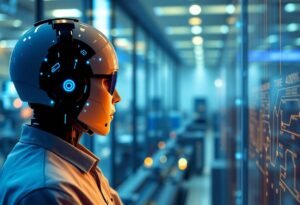The integration of Artificial Intelligence (AI) in advanced robotics is driving remarkable innovations in various industries. As technology evolves, AI empowers robotics to perform complex tasks autonomously, increasing efficiency and productivity while reducing human error. This dynamic interplay between AI and robotics not only enhances manufacturing processes but also paves the way for groundbreaking applications across healthcare, logistics, and beyond.
Enhancing Efficiency Through AI-Driven Robotics
The role of AI in advanced robotics is significantly transforming industries by enhancing efficiency. Traditional robotics often relied on predefined programming, which limited flexibility and adaptability. With the advent of AI, robotics can learn from their environments and make real-time decisions. For instance, in manufacturing, AI algorithms analyze production data to optimize workflows, thereby minimizing downtime and maximizing output. This ongoing learning process enables robots to adapt to changes swiftly, offering a competitive edge to businesses that leverage these advanced systems.
Revolutionizing Healthcare with Intelligent Robotics
AI-powered robotics are reshaping the healthcare landscape, offering innovative solutions for patient care and surgical procedures. Surgical robots equipped with AI capabilities assist surgeons in performing complex surgeries with greater precision and control. These robots can analyze vast amounts of data, such as patient history or real-time imaging, allowing for tailored treatment plans. Furthermore, robotic assistants enhance the patient experience by providing companionship or facilitating daily tasks, improving overall well-being and operational efficiency in healthcare facilities.
Autonomous Logistics: Streamlining Supply Chains
The logistics sector is witnessing a revolution thanks to AI-integrated robotics. Autonomous delivery robots and drones are becoming integral to supply chains, ensuring efficient and timely deliveries. AI enhances route optimization, allowing these robots to navigate obstacles and adapt to traffic conditions in real time. Companies implementing AI robotics in logistics enjoy cost reductions and improved reliability, resulting in satisfied customers and a robust reputation in the market. This development signifies a shift towards a more automated and intelligent supply chain environment.
AI and Robotics in Environmental Sustainability
As industries seek sustainable solutions, AI-powered robotics are making significant contributions towards environmental conservation. Robots equipped with AI technology are deployed in environmental monitoring, enabling data collection and analysis for better resource management. For instance, drones equipped with sensors can monitor air quality and assess ecological impacts, allowing organizations to develop strategies to mitigate environmental harm. By optimizing energy usage and material consumption, AI-driven robotics play a crucial role in promoting sustainable practices across various sectors.
The Intersection of AI and Human Collaboration
While much focus is on automation, the collaboration between AI-driven robots and human workers is essential for maximizing innovation. Intelligent robotics can handle repetitive and hazardous tasks, freeing employees to engage in more complex and creative problem-solving. This synergy fosters a collaborative work environment, leveraging the strengths of both AI and human ingenuity. As industries move towards smarter solutions, understanding this partnership is key to unlocking new avenues of growth and innovation.
Future Perspectives: AI Robotics in Everyday Life
Looking ahead, the integration of AI in advanced robotics is set to become increasingly prevalent in daily life. From smart home assistants to delivery systems, AI-enhanced robots are on the verge of transforming how we live and work. The continuous advancements in machine learning and robotics technology promise to inspire further innovation, encouraging industries to rethink their operational frameworks. As society embraces these technologies, it is crucial to consider ethical implications and ensure responsible deployment that benefits humanity as a whole.
Disclaimer: The contents of this article are for informational purposes only and should not be considered as professional advice.





















